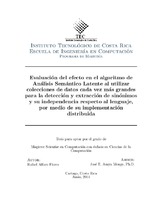Mostrar el registro sencillo del ítem
Evaluación del efecto en el algoritmo de Análisis Semántico Latente al utilizar colecciones de datos cada vez más grandes para la detección y extracción de sinónimos y su independencia respecto al lenguaje, por medio de su implementación distribuida
| dc.contributor.advisor | Araya-Monge, José | es |
| dc.contributor.author | Alfaro-Flores, Rafael | |
| dc.date.accessioned | 2016-10-28T17:58:13Z | |
| dc.date.available | 2016-10-28T17:58:13Z | |
| dc.date.issued | 2014 | |
| dc.identifier.uri | https://hdl.handle.net/2238/6674 | |
| dc.description | Proyecto de Graduación (Maestría en Computación) Instituto Tecnológico de Costa Rica, Escuela de Ingeniería en Computación, 2014. | es |
| dc.description.abstract | Access to large data, especially for text processing applications, results in more effec tive algorithms and therefore becomes transcendental to take advantage of these large amounts of data. Latent Semantic Analysis (LSA) is an unsupervised machine learning algorithm which benefits from these features and can be used for synonym detection and extraction. LSA takes advantage of the implicit semantic structure that exists in the association between documents and the terms they contain to statistically analyze the relationships between the terms of the collection of text documents; and because it uses a strictly mathematical approach, it is inherently independent of language. This is a thesis for the Masters in Computing degree that analyzes the LSA algorithm in a distributed environment, in order to evaluate its effect for synonym detection and extraction on larger collections of data. | es |
| dc.description.sponsorship | Instituto Tecnológico de Costa Rica. | es |
| dc.language.iso | spa | es |
| dc.publisher | Instituto Tecnológico de Costa Rica | es |
| dc.rights | acceso abierto | es |
| dc.subject | Algoritmos | es |
| dc.subject | Datos | es |
| dc.subject | Aprendizaje | es |
| dc.subject | Análisis semántico latente | es |
| dc.subject | Estadística | es |
| dc.title | Evaluación del efecto en el algoritmo de Análisis Semántico Latente al utilizar colecciones de datos cada vez más grandes para la detección y extracción de sinónimos y su independencia respecto al lenguaje, por medio de su implementación distribuida | es |
| dc.type | tesis de maestría | es |
Ficheros en el ítem
Este ítem aparece en la(s) siguiente(s) colección(ones)
-
Maestría en Computación [119]


